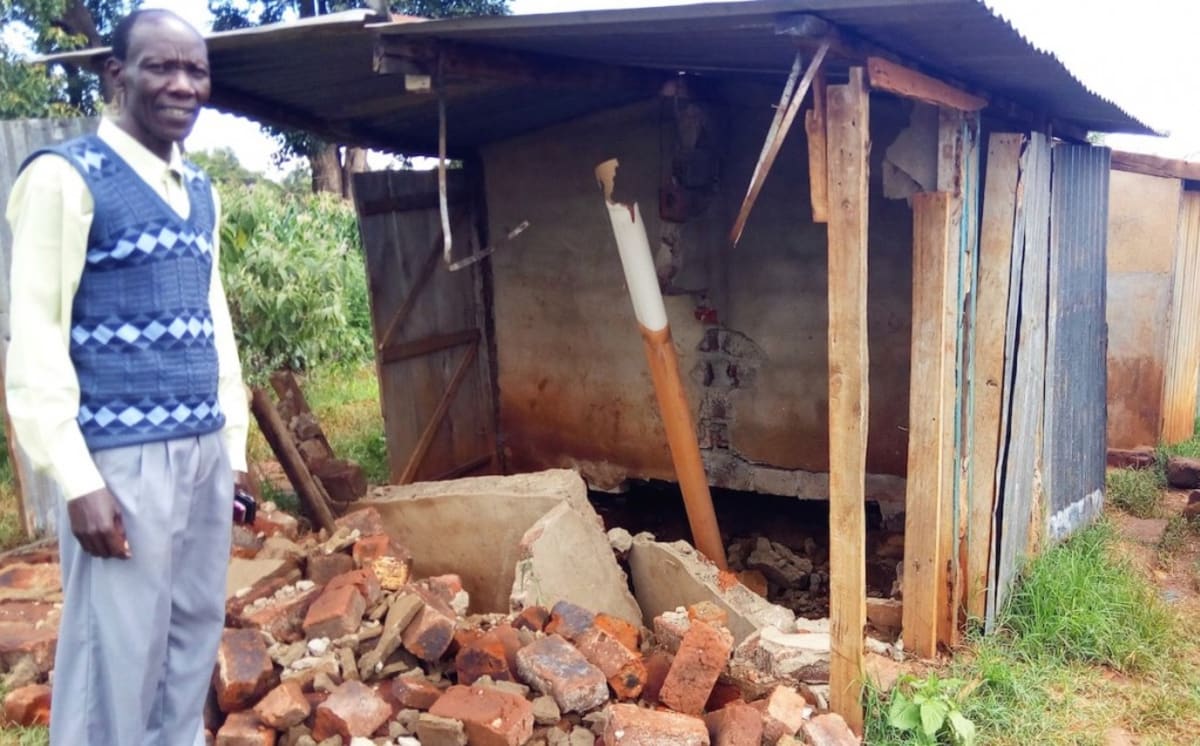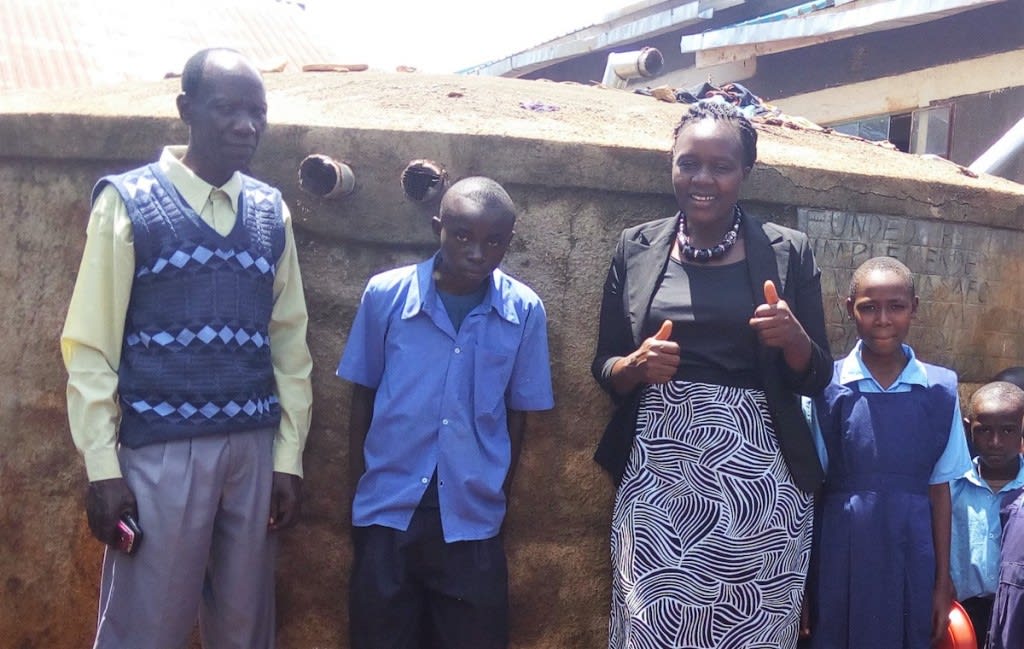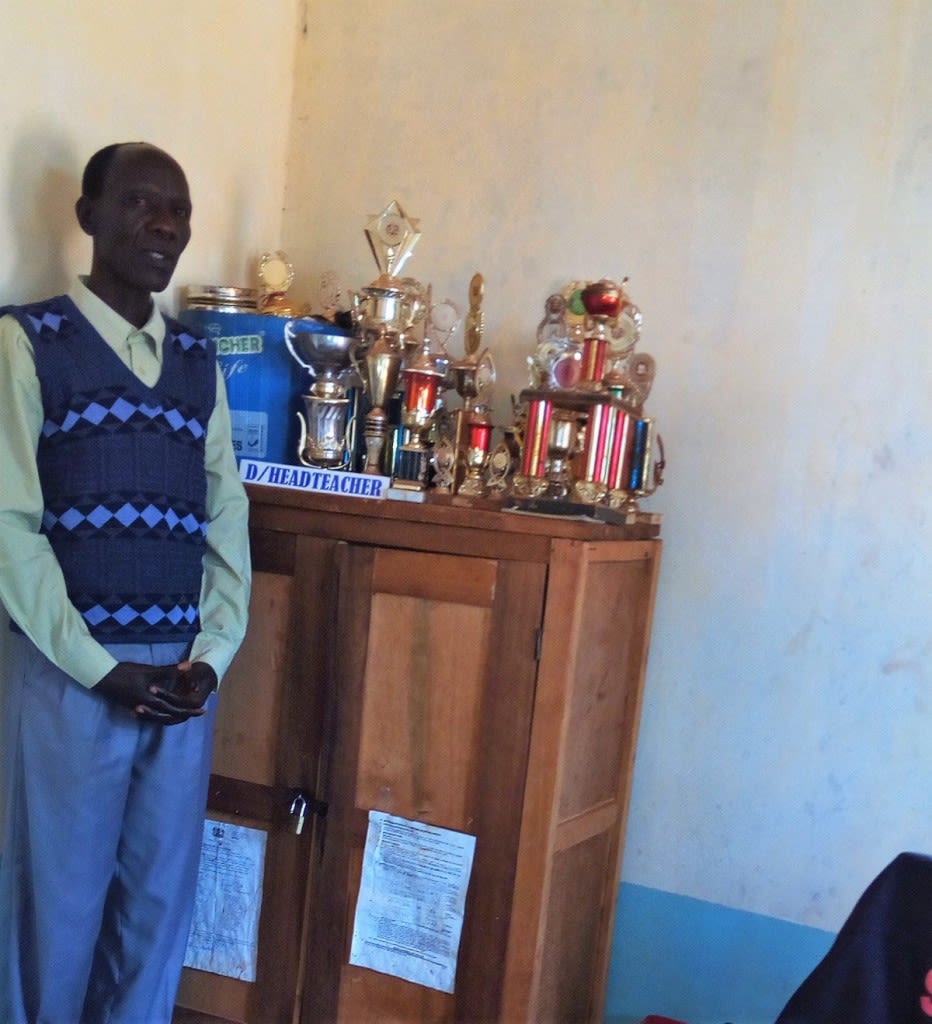This project is a part of our shared program with Western Water And Sanitation Forum (WEWASAFO). Our team is pleased to directly share the below report (edited for clarity, as needed).
Background Information
Vokoli Primary School was started in 1927 by Friends Church of Vokoli. The school is located in Vokoli Village, Vokoli sub-location, Wodanga location, Sabatia constituency of Vihiga County.
The school has a primary section population of 650 pupils, 365 boys and 295 girls. The early education section has a total population of 190 pupils of which 100 are boys and 90 are girls. The total number of teachers employed by the primary section is 16. The early education section has six teachers. The school also has three support staff, two watchmen and one cook. (Editor’s Note: While this many people may have access on any given day, realistically a single water source can only support a population of 350-500 people. This site would make a great location for a second project. To learn more, click here.)
The Current Source
The school’s only source of water is that supplied from a community water catchment tank funded by The Water Trust. To gain access to this tank, the school pays a total of ksh 500 per month and thus ksh 2000 per term.
The supply, however, is not regular. Pupils often have to walk to a protected spring located 1.5 km away from school. They thus waste a lot of valuable time in search of water for school instead of doing school. And since the school has a feeding program for the early education department, grades seven and eight and all of the teachers, they require a lot of water for cooking, cleaning and drinking.
The protected spring is located across the busy Chavakali-Eldoret Highway, which poses a great risk to pupils who can be knocked down by fast-moving vehicles. A lot of time is also wasted by pupils waiting for a break in traffic before they cross. This spring is located within a different community, so students normally have to wait for the community members to finish fetching water first before they themselves can fetch. Sometimes, there are even conflicts that arise between the community members and the pupils. As a result, the pupils fear going to this protected water source and instead opt for any other source that is nearby. In most cases, these sources are unprotected. This has led to increased cases of waterborne diseases such as amoeba and diarrhea-related, cholera, and typhoid.
Sanitation Situation
The school compound has a total of five VIP latrines and one urinal for boys, and six latrine doors for girls. The latrines are in very poor condition, almost full and virtually inaccessible. Furthermore, because of a lack of security for the school, community members keep stealing the latrine doors. The girls cannot use the latrines that don't have doors, greatly increasing the time wasted waiting in line. Due to the latrines' poor hygienic condition and a lack of hand-washing facilities, there is heightened transmission of diarrheal diseases. As a result, many pupils have been reporting stomachaches and typhoid infections.
Training Sessions
Training will be held for two days. The facilitator will use PHAST (participatory hygiene and sanitation transformation), ABCD (asset-based community development), CTC (child to child), lectures, group discussions, and handouts to teach health topics and ways to promote good practices within the school. The CTC method will prepare students to lead other students into healthy habits, as well as kickstart a CTC club for the school.
Construction
The school community is willing to contribute the required local materials so that they can construct a water catchment tank and additional VIP latrines. This will go a long way in reducing waterborne diseases among pupils and teachers. In the meantime, the school agreed to start treating drinking water to reduce rates of waterborne diseases.
Project Results: Training
Hygiene and sanitation training was held at the school compound so that the facilitator could demonstrate practical behaviors for everyday health. The head teacher mobilized participants from the School Board of Management, teachers, and student representatives. A total of 20 people were in attendance, comprised of the deputy head teacher, a sanitation and health teacher, two school board members, and 14 students. School staff also ensured that a classroom and meals were provided to the training facilitator and participants.
Topics covered during training included:
- Promoting good health
- Hand-washing
- Healthcare
- Children's rights
- Starting and running a CTC club
- Operation and maintenance of VIP latrines, the rainwater catchment tank, and hand-washing station
The facilitator used demonstrations, onsite practicals, brainstorming, discussions, role plays, and lectures to teach the above topics and more. Everyone was very grateful for the knowledge shared. After the two days, Deputy Head Teacher Mwenesi John said, "Thank you for making our dream of having safe water available in school come true. Our learners will now be able to have water close to them and this will save them time to study previously wasted going to fetch water. We will observe personal, environmental, food, water and sanitation hygiene for healthy Vokoli Community. Thank you!"
VIP Latrines: Construction of two triple-door VIP latrines is complete and are now in use. Three doors are for the boys, and three doors are for the girls. These additional facilities were installed just in time, since the other 11 latrines are in poor condition and almost full.
Hand-Washing Stations
Two hand-washing stations were delivered and installed, and are now in use by students. Because of the pupils’ training on proper procedures for hand washing, both boys and girls alike are happy to wash hands and demonstrate their knowledge for others.
Due to the high student population, the CTC health club members were trained on how to construct other hand-washing stations with containers, ropes, and poles. The club members will also ensure that these containers are always filled with water.
Research has proven that 90% of diarrheal diseases can be prevented by proper hand-washing with soap. This project is expected to tremendously reduce sickness among pupils.
Rainwater Catchment Tank
Construction for this 30,000-liter rainwater catchment tank began on January 31st. The process began with site clearance, setting and casting the foundational slab, construction of the wall, roofing, and installation of fittings such as delivery pipes, vent pipes, and screens. Finally, good drainage was ensured.
The community provided many materials that were used to build the structure, such as bricks, sand, hardcore, ballast, sugar sacks, and poles. The school also made sure that the construction team was taken care of well, providing both meals and accommodation.
Construction work was paused for two days because the school lost one of its pupils. It is customary that the entire community take those days to bury and mourn the loss of its own.
Students and parents are grateful for the new tank, and the school will take responsibility for its care. A member of the Management Board, Mary Madoga, "We will ensure the water and sanitation facilities are well taken care of, the health club will be functional to ensure sustained behavior regarding proper sanitation and health so that our children can remain healthy." For example, the school will lock the tank at night and over holidays, clean gutters, and set aside maintenance funds.
Thank You for restoring hope to the students and staff at Vokoli Primary School!



 Rehabilitation Project
Rehabilitation Project























